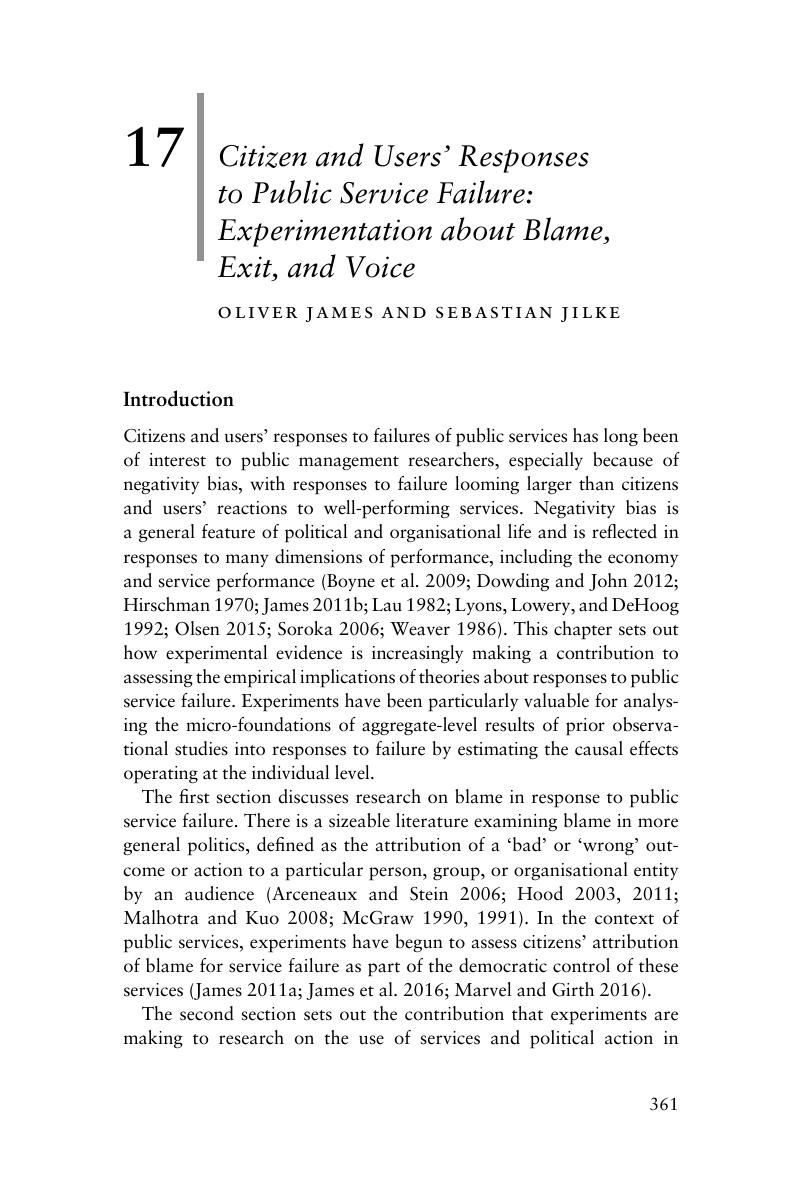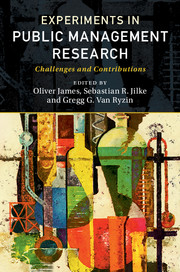Book contents
- Experiments in Public Management Research
- Experiments in Public Management Research
- Copyright page
- Contents
- Figures
- Tables
- Contributors
- Preface and Acknowledgements
- Part I Context
- Part II Methods
- Part III Substantive Contributions
- 8 Work Motivation
- 9 Experimenting with Leadership in Public Organisations
- 10 Prospects for Experimental Approaches to Research on Bureaucratic Red Tape***
- 11 Managerial Use of Performance Data by Bureaucrats and Politicians
- 12 Citizens and Public Performance Measures: Making Sense of Performance Information
- 13 Public Sector Transparency
- 14 Representative Bureaucracy: An Experimental Approach
- 15 Coproduction of Public Services
- 16 Expectations of and Satisfaction with Public Services
- 17 Citizen and Users’ Responses to Public Service Failure: Experimentation about Blame, Exit, and Voice
- 18 Assessing Public Support for Government Policy: Comparing Experimental and Attitudinal Approaches
- 19 Legislative Oversight of the Bureaucracy: Insights from Formal Modelling and Experimental Testing
- 20 Experimental Research for Nonprofit Management: Charitable Giving and Fundraising
- Part IV Issues and Implications
- Appendix Recommended Reporting Guidelines for Experiments in Public Management, a Checklist1
- Index
- References
17 - Citizen and Users’ Responses to Public Service Failure: Experimentation about Blame, Exit, and Voice
from Part III - Substantive Contributions
Published online by Cambridge University Press: 27 July 2017
- Experiments in Public Management Research
- Experiments in Public Management Research
- Copyright page
- Contents
- Figures
- Tables
- Contributors
- Preface and Acknowledgements
- Part I Context
- Part II Methods
- Part III Substantive Contributions
- 8 Work Motivation
- 9 Experimenting with Leadership in Public Organisations
- 10 Prospects for Experimental Approaches to Research on Bureaucratic Red Tape***
- 11 Managerial Use of Performance Data by Bureaucrats and Politicians
- 12 Citizens and Public Performance Measures: Making Sense of Performance Information
- 13 Public Sector Transparency
- 14 Representative Bureaucracy: An Experimental Approach
- 15 Coproduction of Public Services
- 16 Expectations of and Satisfaction with Public Services
- 17 Citizen and Users’ Responses to Public Service Failure: Experimentation about Blame, Exit, and Voice
- 18 Assessing Public Support for Government Policy: Comparing Experimental and Attitudinal Approaches
- 19 Legislative Oversight of the Bureaucracy: Insights from Formal Modelling and Experimental Testing
- 20 Experimental Research for Nonprofit Management: Charitable Giving and Fundraising
- Part IV Issues and Implications
- Appendix Recommended Reporting Guidelines for Experiments in Public Management, a Checklist1
- Index
- References
Summary

- Type
- Chapter
- Information
- Experiments in Public Management ResearchChallenges and Contributions, pp. 361 - 375Publisher: Cambridge University PressPrint publication year: 2017
References
- 5
- Cited by



